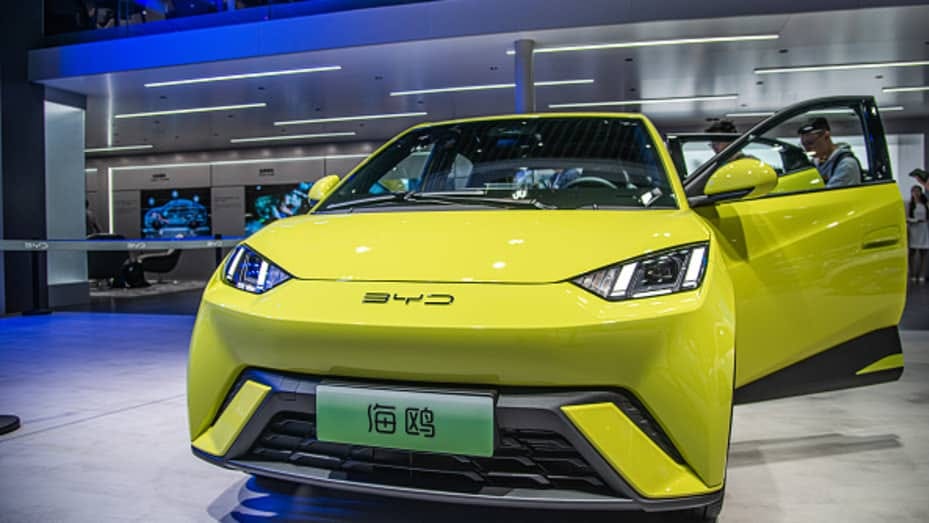Yves here. The “Crush” ad has allowed for an overdue “hating on Apple” moment. As much as Steve Jobs was a great designer, and the modern Apple has strayed markedly from his vision, Jobs was also very controlling and went as far as he could in restricting users to a closed environment. This sort of capture and tight linkages to other products and services in your ecosystem is a key element in forcing consumers to accept renting rather than owning what were formerly products like particularly editions of software. I stopped getting Adobe Acrobat now that I have to keep renting it. I had to argue with my tech person over buying Microsoft Office rather than renting it. So what if I have to buy it again? I don’t need new features and my last copy survived ten years of OS updates. And I don’t like the spying potential in Microsoft sending me frequent new versions.
The renting problem extends beyond third party products. Nearly all companies of any size store data in “the cloud”. Mind you, this is their data. Except it isn’t. I have had readers explain long form (and I wish I had hoisted those comments into a post back then) that they become hostage to the cloud provider and cannot readily get their data back.
It’s become common to point to the purported Davos Man model of “you will own nothing and be happy.” But this is simply the old sharecropper model in new clothes. As Matt Stoller wrote in his 2010 post, The Debtcropper Society:
A lot of people forget that having debt you can’t pay back really sucks. Debt is not just a credit instrument, it is an instrument of political and economic control.
It’s actually baked into our culture. The phrase ‘the man’, as in ‘fight the man’, referred originally to creditors. ‘The man’ in the 19th century stood for ‘furnishing man’, the merchant that sold 19th century sharecroppers and Southern farmers their supplies for the year, usually on credit. Farmers, often illiterate and certainly unable to understand the arrangements into which they were entering, were charged interest rates of 80-100 percent a year, with a lien places on their crops. When approaching a furnishing agent, who could grant them credit for seeds, equipment, even food itself, a farmer would meekly look down nervously as his debts were marked down in a notebook. At the end of a year, due to deflation and usury, farmers usually owed more than they started the year owing. Their land was often forfeit, and eventually most of them became tenant farmers.
They were in hock to the man, and eventually became slaves to him. This structure, of sharecropping and usury, held together by political violence, continued into the 1960s in some areas of the South. As late as the 1960s, Kennedy would see rural poverty in Arkansas and pronounce it ’shocking’. These were the fruits of usury, a society built on unsustainable debt peonage.
Today, we are in the midst of creating a second sharecropper society.
Back then, a mere 14 year ago, Stoller did not consider leasing of intellectual property or having ownership of critical implements like tractors undermined by intellectual property claims. But it’s another manifestation of his debtcropper model.
Mind you, there is nothing wrong with renting per se if both sides have decent bargaining power and/or relevant laws protect the property rights of renters. In New York City, one of the strong protections afforded to tenants in rent stabilized and controlled apartments was that the landlord had to offer a lease renewal if the tenant was current with the rent. Being able to stay in a rental long-term greatly changes the tenant’s relationship to the property. I was in a building in a good address with a lot of rent stabilized units. Many tenants spent a lot of money fixing them up because they anticipated being there a long time.
But note the Stoller point about sharecroppers blindly accepting their agreements with “the man”. Software and credit card customers are in exactly the same boat.
By Thomas Neuburger. Originally published at God’s Spies
A rent-seeking economy, queued up to pay
I want to examine two pieces that touch the same theme: how neoliberalism as an economic system enshrines the extraction of rent over industrial production (the making or real things); and how this trend would end in the failure of the West, absent a climate-crossed future.
I’m making this available to all subscribers since the points are integrated. Musicat the end.
The Sale of Manufacturing to Enrich the Rich
Consider the following pieces as a set.
• You Can’t Run Industrial Policy OR A War Economy Under Neoliberalism (Ian Welsh)
Welsh starts by comparing the creation of EV charging stations in the US and China. The US government spent $7.5 billion in subsidies; the Chinese government spent $10 billion roughly. Total stations produced by the $7.5 billion program: seven stations.
- Total EV charging stations in the US: 186,200.
- Total in China: seven million, of which 2.2 million are public.
Then he makes his larger point, that the neoliberal system in the US is designed not to produce.
[Y]ou can’t run industrial policy or a war economy under neoliberalism. It’s impossible. …
Washington spends 7.5 billion for 7 charging stations. This isn’t just incompetence, this is corruption. Yes, China and Russia have corruption. Lots of it. It is nothing compared to American and European corruption, not even on the same scale. In China, especially, most corruption is “honest corruption” — you can take a slice, but you have to actually deliver. If X number of homes or charging stations are to be produced, you’ve got to produce them.
Which leads to this:
Simply put, neoliberalism is about unearned money: about capital gains; PE plays where you buy a company with debt, load it with the debt and then dump it; monopolies and oligopolies and getting government to juice asset prices or pay you far more than you deserve for shoddy goods (see mil-industrial complex.)

All this is true. China’s industrial policy enriches the country at the expense of the rich. U.S. industrial policy enriches the rich at the expense of the country.
As a result (Welsh argues) China now creates good products — like its latest electric cars, which U.S. politicians fear — while we create crap. And now (Welsh would add) there’s no going back for us; the future is theirs.
I’ll add, it would be theirs if it’s anyone’s at all. Sadly, this century will be no one’s.
The message: Don’t count on the donor class to fix this mess. They want it this way.
• Finance Capitalism versus Industrial Capitalism: The Rentier Resurgence and Takeover (Michael Hudson)
Thanks to a fascinating piece at Naked Capitalism on Apple’s awkwardly on-the-nose “Crush” ad (see below), I’m pointed to an address given by Michael Hudson on the same theme, the West’s surrender to finance capitalism and what that means for the world:
One must conclude that America has chosen no longer to industrialize but to finance its economy by economic rent—monopoly rent from information technology, banking, and speculation—and leave industry, research, and development to other countries. Even if China and other Asian countries did not exist, there is no way that America can regain its export markets or even its internal market with its current overhead debt and its privatized and financialized education, health care, transportation, and other basic infrastructure.
The underlying problem is not competition from China but neoliberal financialization. Finance capitalism is not industrial capitalism. It is a lapse back into debt peonage and rentier neo-feudalism. Bankers play the role today that landlords played up through the nineteenth century, making fortunes without corresponding value from capital gains for real estate, stocks, and bonds on credit and from debt leveraging—whose carrying charges increase the economy’s cost of living and doing business.
Not much different from Welsh’s point. Welsh carries it further, predicting the collapse of Western hegemony. Hudson makes no such prediction, but like Welsh, identifies the current war between West and East as a fight between economies, not countries:
Today’s new Cold War is a fight to internationalize this rentier capitalism by globally privatizing and financializing transportation, education, health care, prisons and policing, the post office and communications, and other sectors that formerly were kept in the public domain. In Western economies, such privatizations have reversed the drive of industrial capitalism.
Whatever else they’re doing, Russia and China still make things — thus, at least in part, Hudson’s “new Cold War.”
Is Apple a Manufacturer?
To return to Apple for a moment, one product of this thought is that Apple is no longer part of the manufacturing economy, but has become a rent-seeker instead.

Naked Capitalism quotes Jathan Sadowski saying this…
Rather than representing some disruptive new “subscription” paradigm, however, what all these companies are doing — including Apple — is revitalizing of an old form of rentier capitalism that we long associated with landlords and feudalism.
Whether we call it platform capitalism, surveillance capitalism, or just next-gen rentier capitalism, this model for how capital operates uses mediation and enclosure to achieve extraction and control over its subjects. “Rentier” refers to a relationship where an asset owner charges others to access that asset, just as a landlord charges tenants to rent a home the landlord owns.
…and points to a 2019 piece in Salon titled “Pay us forever: Apple wants you to rent your life from them”:
Apple, a tech company renowned for its gadgets, held an event on Monday in which it announced five new offerings, only one of which was an actual gadget (the little under-the-TV box known as the Apple TV). The rest of its new products were “services,” an ethereal category so profitable that it has become the second-biggest revenue generator at the most valuable public company in the world. What “services” refers to, really, are things that you subscribe to and pay for forever, or at least until your subscription terminates. But Apple, like every other subscription business model, would prefer your subscription doesn’t terminate.
Life in a landlord’s world. They want it this way.
That Apple Ad
As if the thought of this much predation wasn’t enough, the Apple “Crush” ad hits the heart as well. It shows the destruction of what we use to make art — brushes and paint; trumpets, pianos, guitars — plus mannequins and toys, things that bring us delight — compressed with brute force into a hardware platform whose tools we must rent to use.
Play the following with sound off to get the effect.
And in case you missed what Apple did so wrong, here’s the ad in reverse:
Still loving them Apples now?
Music
I couldn’t resist. Here’s a remastered performance of Pink Floyd’s “Money.”
For music theory fans, note this is 7/4 time, counted 3 + 3 + 1. (You might compare this with the 5/4 rhythm in the song “Je suis jalouse” from a previous post.)


